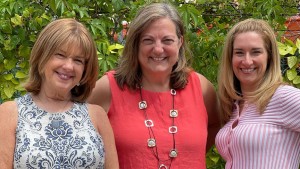Researcher Highlight – Maude Champagne
September 12, 2022 | News

Pictured here are Maude and colleagues in their new roles AFCCA roles with Adopt4Life (left to right): Nancy Lockwood, Tanya Eichler, and Maude Champagne (photo courtesy of Tracy Moisan)
Weathering the Storm: Aggression toward Family/Caregivers in Childhood and Adolescence (AFCCA)
Maude Champagne, KBHN and Adopt4Life Create a New AFCCA Family Support Program
As a kid, Maude Champagne was very curious, and loved learning but didn’t like sitting for hours in school. Now she is a neurosciences PhD candidate at Queen’s University, specializing in Fetal Alcohol Spectrum Disorder (FASD) and studying with Professor James Reynolds (Chief Scientific Officer of Kids Brain Health Network). Today, Maude has new reasons for being always on the go as a clinician, scientist, program developer, mom, advocate and speaker–who also swears by taking the restorative time she needs.
Maude and her partner formed a family with five children through birth and adoption. Some of their children have developmental disabilities, and each has their own unique background, needs and strengths. As a registered social worker and psychotherapist, Maude shares that she grew up with a sibling who had a severe disability and passed away at a young age, and that she has always had a deep commitment to helping people.
Maude began working with Kids Brain Health Network several years ago, implementing the Fetal Alcohol Resource Program (FARP) with James Reynolds, Nancy Lockwood, Tanya Eichler and Janet Carioni. The four women have become dedicated friends and collaborators. The Challenge
After FARP, Maude continued her research and studies through the KBHN-Mitacs internship program, working with ABLE2 to assess the innovations of virtual programming during the COVID-19 pandemic.
While interviewing participants, Maude noticed that many parents and families were experiencing challenges with mental health, and that many children and adolescents commonly expressed aggression toward their parents and families. As a psychotherapist, and at that time as part of her role with Adopt4Life’s mental health advisory committee, Maude was also receiving calls from caregivers about escalating aggression from their children.
Seeing a pattern of unmet needs for families and relevant gaps in Canadian research, Maude was instrumental in bringing three innovations to the community as a result of her KBHN-Mitacs internship:
- A Nonviolent Resistance (NVR) pilot program
- The first National Consortium on Aggression Toward Family/Caregivers in Childhood and Adolescence (AFCCA)
- The AFCCA Family Support Program

The Solutions
Maude connected James to Adopt4Life founder and executive director, Julie Despaties, to collaborate on the identified issue of aggression toward family/caregivers in childhood and adolescence (AFCCA).
KBHN and Adopt4Life funded and carried out the first national consortium on AFCCA, including a research project for families across Canada, further leveraging the KBHN-Mitacs internship program. It was especially important to Maude to be sensitive to families’ needs during the process.
“My experience as a family member dealing with scientists or researchers was that they are ‘in charge’ and we have to listen to them,” says Maude, “but James always said it’s about what the community needs and families want. This is what really inspired me to continue working with him and KBHN. I felt like we shared the same values of empowering and hearing the needs of families. I think KBHN is working really hard to bring equity to this work, and we’re all learning.”
The research identified various challenges arising for young people showing aggressive behaviour: Escalating mental health issues and low self-esteem; barriers to belonging at school and in community; strained family relationships, and; in some cases having to live separately from their families, which resulted in unnecessary exposure or re-entry to child welfare systems. Children in foster care lacking adequate support were facing further instability from broken placements. In biological and adoptive families alike, caregivers and family members were experiencing mental health challenges, damaged relationships, and loss of employment income due to illness or increased responsibilities at home.
Maude also explains that children who demonstrate aggressive behaviour may be labelled as “violent perpetrators” and as a result be deprived of their right to education, or criminalized in adolescence. The National Consortium on AFCCA website suggests the alternative of comparing our range of human behaviours to the wind–a natural occurrence that can range from a gentle breeze to a tornado, requiring different responses and supports depending on intensity. Thanks to the work of Maude and her colleagues, increasingly families won’t have to weather their storms alone.
National Consortium on AFCCA program director Tracy Moisan, is also an adoptive parent of three youth, including two with neurodevelopmental disabilities. “Through Maude’s work, and other researchers now studying AFCCA from a Canadian lens, we’re learning so much more about the reasons that AFCCA happens, and most importantly the strategies that can offer real hope and answers for youth and their parents/caregivers.”
Adopt4Life’s forthcoming AFCCA Family Support Program uses a strengths-based approach, and understand the needs being communicated behind a child’s behaviour instead of placing blame. For Maude, the AFCCA Family Support Program’s focus on strengths isn’t about ignoring challenges or being defined by challenges. Instead, it’s about finding the balance between resources and needs for children, caregivers, families and communities.
In Canada, there is no single intervention to fully address aggression in the home among children and youth. Maude, along with Adopt4Life’s AFCCA Family Support program team, are exploring Nonviolent Resistance (NVR)—an intervention known across Europe, and the focus of Maude’s PhD thesis. Building on evidence from attachment theory, family systems theory, and interpersonal neurobiology, NVR focuses on dysregulated interactions between young people and their caregivers. NVR is expected to improve self-regulation for children and parents, leading to less aggression in the home and improved placement stability.
“I think the main goal for KBHN and Adopt4Life is improving the quality of life for families who have children with complex brains and complex stories,” Maude says. “Sometimes we may miss early intervention, and we need to put in more effort, but it’s possible to achieve a greater quality of life for these families. And that has the potential to significantly change outcomes for kids and youth.”

Maude Champagne with colleagues
Pictured here are Maude and colleagues in their new roles AFCCA roles with Adopt4Life (left to right): Nancy Lockwood, Tanya Eichler, and Maude Champagne (photo courtesy of Tracy Moisan)